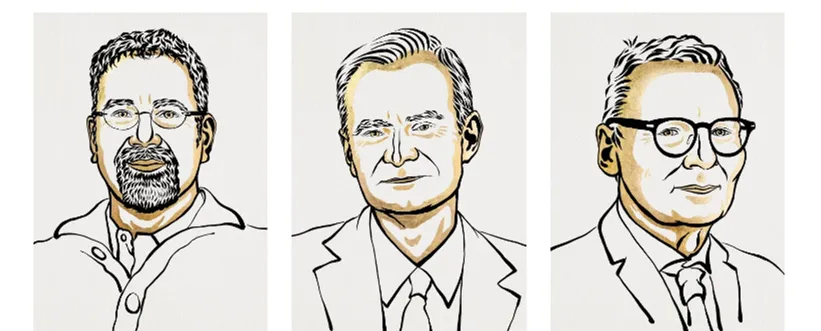
Winners of This Year’s Nobel Prize in Economics Announced
Three economists have been awarded the Nobel Prize for their "studies on how institutions are formed and how they affect prosperity." Daron Acemoglu, Simon Johnson, and James Robinson will share the prize, which includes a cash award of 11 million Swedish kronor (about 1 million dollars). The Nobel Committee highlighted that the award was given to the three economists for explaining why "societies with a poor rule of law and institutions that exploit the population do not generate growth or change for the better."
We asked some Bocconi professors to share their thoughts:
The Nobel for Acemoglu, Johnson, and Robinson is, in some ways, not a surprise. Their research has long focused on the impact that the quality of institutions has in promoting growth and development, and in reducing disparities between countries. Furthermore, their work makes extensive use of longitudinal empirical evidence, which is highly appreciated by those who consider the historical method a fundamental component in the social sciences.
The 2024 Nobel Prize in Economics was awarded to Daron Acemoglu, Simon Johnson, and James Robinson for their influential research on how institutions shape economic development and prosperity. Their work demonstrates that political and economic institutions play a crucial role in determining long-term economic outcomes.
A key aspect of their contributions involved using the colonial experience as a natural experiment to study how institutions affect long-term prosperity. They found that in places where European settlers faced low mortality and could settle, they replicated European institutions, which were conducive to building prosperous economies. Conversely, in regions where settlers faced high mortality and could not settle, they instead set up extractive institutions designed to exploit resources. Their work also shows that, among former colonies, those that were relatively rich in 1500 are now relatively poor, because colonizers established more exploitative institutions in initially prosperous areas to extract resources.
They argue that these institutional configurations have persisted over time, continuing to affect economic performance today, as regions with extractive institutions still tend to have poorer economic outcomes.
This analysis led them to pioneer new interdisciplinary approaches to studying economic development, such as combining historical natural experiments and theoretical models to address macroeconomic questions.
Their research highlights how economies cannot be understood in isolation from their political context—an extremely relevant theme in today's world where conflicts, authoritarianism, and economic disparities are on the rise. Their studies suggest that economic development is not just a matter of correct economic policies, but also of institutional inclusivity: only when people actively participate in the political and economic life of their nations, and when institutions prevent the concentration of power and the monopolization of resources, is sustainable growth possible. These insights underscore the lasting impact of institutions on global inequality and long-term growth.
In 1993, Douglass C. North received the Noble prize for having demonstrated that, in the economic sphere, “history matters”. Today, Acemoglu, Johnson and Robinson receive the prize for having used history in a way “that matters”: to investigate the institutional factors that, in the long run, lead some societies to grow rich, and condemn others to remain poor. And they did it with great communication skills, reminding everyone that the social sciences, to truly fulfill their duties, must be able to present their results in a way anyone can understand.
The 2024 Nobel Prize in Economics awarded to Acemoglu, Johnson, and Robinson, and celebrates their groundbreaking contributions to understanding how institutions shape economic prosperity. Their innovative research has sparked a remarkably rich body of literature in political economy and development, advancing the use of unconventional data sources and quasi-experimental approaches to address complex, long-standing issues. Their research has not only reshaped the field but also sparked fresh perspectives on economics, fostering creativity in uncovering deep and fundamental societal phenomena. While their innovative approach has generated powerful insights and discussions, their work has laid the foundation for a new generation of scholars bringing to the table new methods and rigor in testing and advancing the foundational hypothesis of an established and growing literature.
Acemoglu, Johnson and Robinson have found ways and methods to use history to understand the role of institutions and technology in determining a country's chances for development. Natural resources and geography are important, but institutions and technology are more so, and since they are modifiable by humans it becomes important to understand how and when they are modifiable in the right direction.
Their work is a milestone on this road to understanding development.
The Nobel Prize awarded to Acemoglu, Johnson, and Robinson, underscores the crucial role that political institutions, and in turn economic institutions, play in shaping economic development. Their work on colonial institutions solved an important empirical challenge — finding a clever way to identify the long-term effect of institutions on prosperity — and revealed how inclusive institutions promote growth, while extractive ones lead to stagnation. Their insights on the role of institutions in economic growth keep motivating and stimulating the work of many economists and political scientists, and have important implications for policymakers.